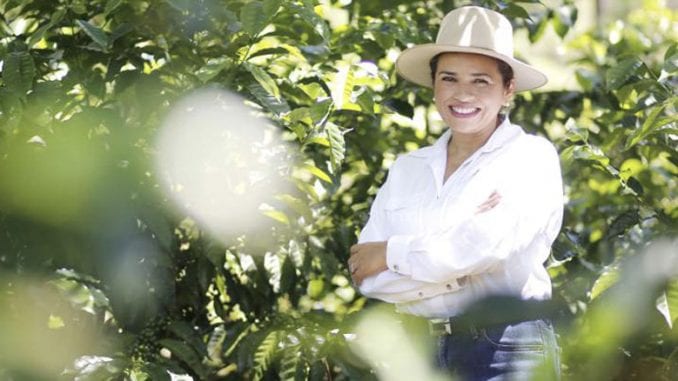
We continue our conversation from the current issue of Barista Magazine with the producers behind the incredibly successful Finca El Puente in Honduras.
BY EVER MEISTER
SPECIAL TO BARISTA MAGAZINE ONLINE
Photos courtesy of Moises Herrera and Marysabel Caballero
From the editor: In the June + July 2019 issue of Barista Magazine, we interviewed Marysabel Caballero and Moises Herrera, the humble and open-minded husband-and-wife team behind Finca El Puente in Honduras. Praised as “one of the most innovative farms in the world” by Counter Culture Coffee, they’ve performed very well at Cup of Excellence and started their own cupping lab to truly gauge the quality of their award-winning coffees. We learned that while Marysabel’s passion for coffee and Finca El Puente stems from childhood memories on the farm, Moises uses his business-minded decision-making to keep things running smoothly; the two complement each other well.
In these extended excerpts from the interview, we learn how Marysabel and Moises have earned their reputation for being skillfully experimental, as well as what they see for producers in the future. You can read the original Q+A via the online e-pub or our free app.
BMag: What else have you learned in your journey as producers?
Marysabel: There is one other thing that you have to take care: the soil. We are very careful to the soil. You know, the roya (coffee leaf rust) attacked us in 2013. It was so bad! But at that moment we saw the roya as an opportunity to grow and to learn, and to not fail again. We said, we can prevent the roya if we take care very well of our trees. And how can we take care very well with our trees? We have to start with the soil. You have to take care of the soil, to put the exact things that the plant needs. You have to return the soil at least some of the things that the plant takes. We started to make every year soil tests, and we start to put compost to the land, every single year. Every step is very important. The nutrition that you give to the trees is very important. Then, another thing that we have been making a lot of tests, from how Counter Culture helps us, is the drying process. We learned how to improve our drying. Because in coffee every step is very important. There are a lot of discoveries. We started to cup the coffee to see how was the coffee with the different drying that we made.
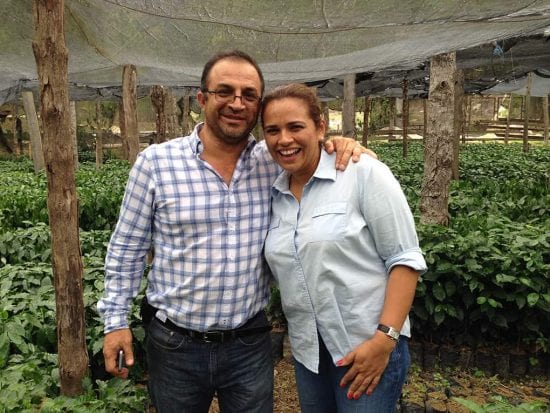
Do you find it helpful to taste other producers’ coffee as well?
Marysabel: Yes, because that is how you learn. We have to learn every day from others! You never know everything. If you think you know everything, you don’t know nothing. I will tell you one story. One day we went to Ethiopia, and now we have African beds, because when we saw them in Ethiopia, we wanted to have African beds. But for us to cover the African beds we would take plastic, and in Ethiopia they have the bamboo covers. We see how it saves a lot of time, and it is very safe for the coffee. Always in every single place that you go in coffee you learn a lot from others.
What are some things that you are doing now for the future?
Moises: These days we need to start to change the way that we produce coffee. Until now we all produce coffee just because our father my grandfather did, or because there were no other options to do nothing in our land. But now we are talking about the future. We need to apply another technology in how we’re producing. For example, we need to use the drones now, because some technology about the drones helps you to know which area in the farm needs more water compared with another, and maybe you can use irrigation systems then. And of course to make experiments, to plant with other varieties. In every way you need to be more professional because the other side, the buyers and roasters, they are very professional now. They start to ask you about a lot of information. Sometimes the coffee producer doesn’t have information. So we need to be more professional in the future.
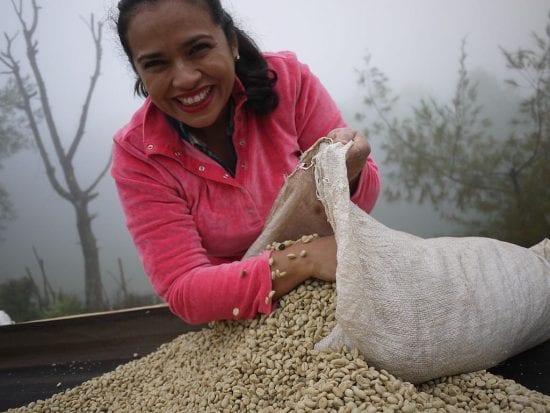
Marysabel: In the future, it will be with scientific results. You know, one other thing that we’ll have in the future is the weather changing. We will have a lot of problems in the future if we don’t take care of the planet now. Just now we can see many different things in the coffee that we didn’t see before—different time of ripening, the time of ripening sometimes is longer, sometimes is shorter. So we have to take a walk ahead. We started to plant new varieties. Which varieties will be more help against drought, for example? That’s why we put a lot of focus in the new varieties. We saw some of the results of the new varieties that we are looking, and we are trying to reproduce some of the results.
What’s your favorite thing about working in coffee and being producers?
Moises: Wow, you know, one of the good things about work in coffee is because you can help another. A lot of other producers and a lot of other people look at this business like only in money. For us, we look at the business like a way to help another, to have impact on the life on the people who live around your farm. It’s like how Marysabel say, it’s very important to take care of the soil: If you will have a good soil, you will have a good production. If the people around you are in a bad way, you don’t have pickers, you don’t have people to clean the farms or anyone to work in the wet mill and the dry mill. One of the very good things about working in coffee is you can help and you can have impact. For example, we support two schools around the farm. We provide sometimes books, sometimes some materials for the teachers, some backpacks for the kids, sometimes simple things like one soccer ball. The last year we build a dining room for the kids because the government provides some food for the kids, but they don’t have a place to eat. So we build a place for them.
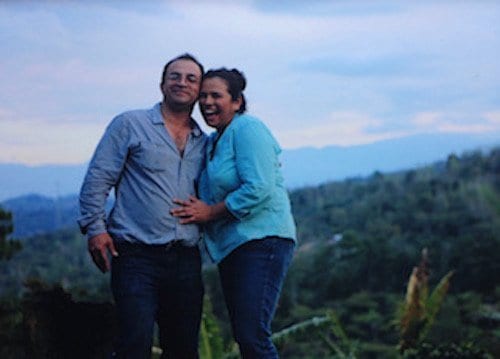
Marysabel: Another thing that is good too is that every year is different from every year. To be a coffee producer is something you can do only if you like. You continue even if you fall down, going up, fall down, going up. If you don’t like, you better not be in coffee because it’s not easy. It’s not easy, but it’s a beautiful life to be in coffee. I can’t visualize my life without coffee. I think I will die being a coffee producer.
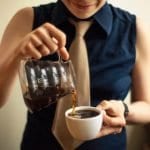
ABOUT THE AUTHOR
Ever Meister (you can call her just Meister) has always led a kind of weird, caffeinated double life. As a coffee professional, she’s been a barista, retail manager, wholesale support representative, and educator; as a journalist, she’s written and/or edited work for The Boston Globe, The Washington Post, Serious Eats, Saveur.com, and Every Day with Rachael Ray magazine, as well as the gem you’re reading right now. These days she can be found selling green coffee for Cafe Imports, riding her bike around the beautiful Twin Cities, and finally (finally!) taking a break from blogging. You can email her at meister@justmeister.com.

